WW1 soldiers' lives study to be published
- Published
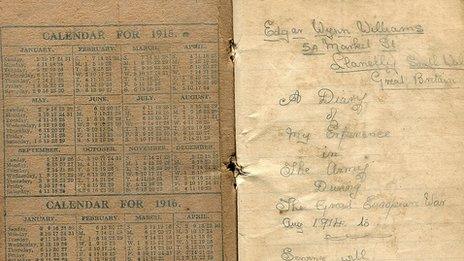
The first page of Edgar Wynn Williams' diary of World War One
Fresh light on the lives of soldiers from Wales who fought in World War One has been shed by Swansea University students.
The second-year students worked with material, loaned by four families, which had never been previously been analysed by historians.
The material will be published in the run up to the war's centenary in 2014.
The project is being launched at the National Eisteddfod on Monday.
One of those present in Denbigh will be Reverend Dr R Alun Evans, whose father joined the Royal Army Medical Corps in October 1914.
Robert Evans left the Congregationalist College, Bala-Bangor, to carry wounded men to the dressing stations during WW1.
Over 250 items including letters, photos and diaries have been digitised and the material will be made available to the general public on the eve of WW1's centenary.
Lecturer Gethin Matthews from Swansea University's history and classics department said: "The main aim of the project is to gain a better understanding of the soldiers - their ideas, hopes and fears as they faced the war.
"The evidence has enabled us to put flesh on the bones and gain a better insight into the society in which they lived."
Dr Matthews said he hoped that launching the materials would stimulate people to consider the true effects of the war on Wales and its societies once more.
The digitised items will all be published on Swansea University's website shortly.
Robert Evans
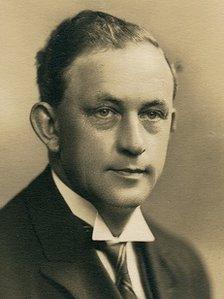
Robert Evans left his studies to serve in the medical corps
Born in Ganllwyd, Dolgellau in 1895, Robert Evans, known as Bob Ty Cerrig by his family, was accepted as a ministerial candidate by Bala-Bangor Congregationalist college.
But one year into his studies World War One broke out and Robert decided to join the Royal Army Medical Corps (RAMC).
The Swansea students were loaned letters and photographs relating to his war experience, including a letter to his mother in October 1916:
"In some places the shells were falling like hail, and some men by my side died, while others were wounded."
Robert's letters are all infused with references to his own faith, which despite all that he witnessed in war, was reinforced.
In one of his letters from France, he notes how he and some of his comrades had the privilege of leading a service. In another he writes how he is looking forward to having a Sunday service back home as he finds a Welsh service more fulfilling than any other.
After the war Robert Evans returned to his theological studies, graduating in 1924 and taking charges of chapels in Yr Hendy and Llanbrynmair.
Edgar Wynn Williams
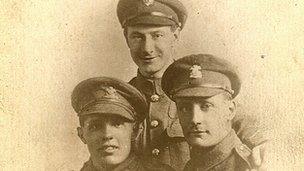
Edgar Wynn Williams (back) and two comrades
A lorry driver who delivered groceries in the Llanelli and Swansea area before the war, Edgar Wynn Williams was 20 when he made the decision to join the Army Service Corps.
He began writing a diary on the day he made the decision - 8 December 1915 - and the next day travelled to Carmarthen to enlist.
On 16 December he bought his sweetheart Olga Bevan an engagement ring and the following day he left Llanelli.
The Swansea students learnt through material loaned by his grandson Dr Rhys Williams of his war experience in Egypt where he served driving the wounded to a field hospital.
It is meeting other Welshmen on the battlefield which gets the most attention in Edgar's diary:
"I met some Welsh Fus [Fusiliers] who are camped near to us we had a good time and it was good to talk a bit of Welsh for once it reminded me of home."
After the war he returned to Llanelli and married his sweetheart Olga, but died aged 34 in October 1929.
His family believe he died from sleeping sickness, a disease which he would have been carrying when he left Egypt in April 1916.
James Pugh Richards
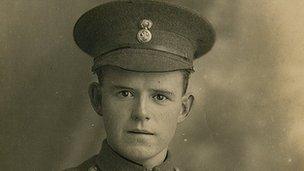
James Pugh (JP) Richards pursued a career in teaching after the war
Born in Duffryn Ardudwy, Meirionnydd in 1895, James Pugh (known as JP) Richards volunteered to serve in the army on 7 October 1914, joining the 13th Battalion of the Royal Welsh Fusiliers.
Among the items loaned to the students by his daughter Eleri Rogers are a series of postcards sent home by JP while training in Llandudno.
One includes an account of a visit by David Lloyd George, who was later to become prime minister, to inspect the troops in March 1915.
The soldier wrote: "Here is a picture for you of the crowd running towards the 'Grand Stand' to see Mr Lloyd George after the march past on Monday."
But he wrote that the politician had to abandon his speech and flee to the Imperial Hotel for sanctuary from the acclamations of the crowd.
On New Year's Day JP wrote a letter home from France where he was stationed near Neuve Chapelle.
"It's a shame to think that we are waging war against a Christian country like our own but there are many signs these days that the end is not far away - this is my prayer 'let the day come soon'".
In October 1917, JP was badly injured in an attack on the German front line, after which his right leg was amputated and his left leg was badly injured.
That marked the end of his active service and he was sent back to hospital in Manchester where doctors managed to save his left leg.
JP went on to study at the University College of Wales, Aberystwyth and later became a teacher at Twyn School, Caerphilly. He died in 1956, aged 61.
Hopkin Joseph Thomas
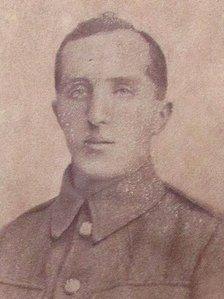
Hopkin Joseph Thomas did not return from the war
Hopkin Joseph Thomas was born in Bryncoch, near Neath and is thought to have enlisted with the Welsh Regiment around February or March 1916.
In material loaned by his relatives David and Val Stokes, the students found that he was serving in Egypt in 1917 with the battalion that had served in the Gallipoli campaign from August to December 1915.
In his letters home Hopkin forms a conversation with his younger brothers Victor and Richard who are also fighting but in another theatre of war:
"I hope the boys are still alright in France? Has Vic gone back to the line yet. I hope he's quite alright by this time. What about Dicky. Has he been home yet. I'm expecting to hear by every mail from him but he's not very keen on writing letters. I guess he hasn't got time etc."
In September 1918, just two months before Armistice Day, Hopkin was wounded and died and was later buried in a war ceremony in Palestine.
After a permanent headstone was put up in March 1925, his family received a photograph of his grave.
- Published4 August 2013
- Published4 August 2013
- Published27 July 2013